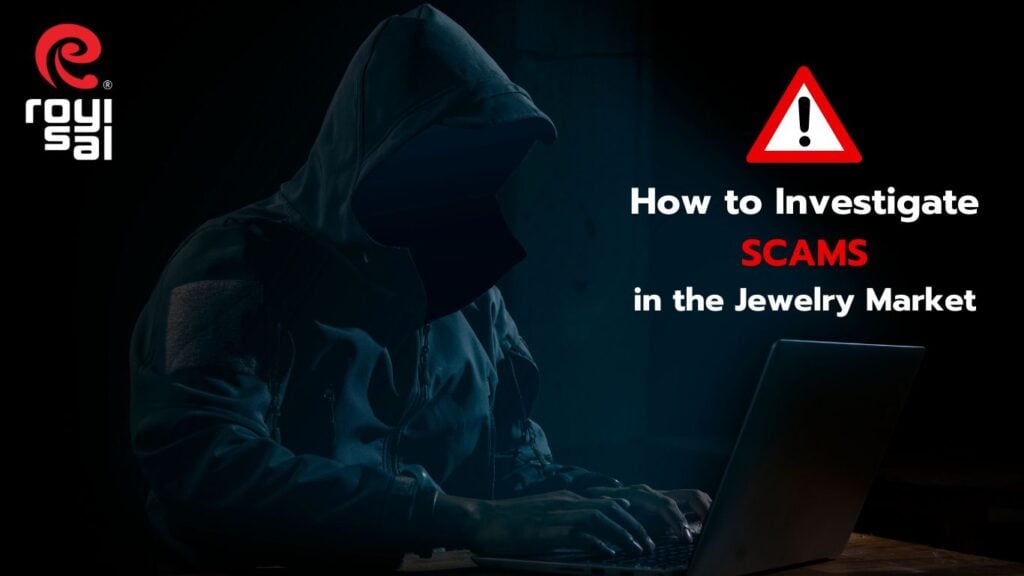
The jewelry market, with its allure of glittering gems and precious metals, attracts not only genuine buyers and sellers but also scammers looking to exploit unwary customers. Identifying and avoiding scams is crucial for anyone involved in purchasing jewelry. This article outlines key steps to investigate and protect yourself from scams in the jewelry market.
How to Investigate Scams in the Jewelry Market
1. Research the Seller
Before making any purchase, thoroughly research the seller. Look for the following:
– Business Credentials: Verify the business credentials and licensing. Legitimate jewelers often display certifications from recognized gemological institutes.
– Online Presence: Check the seller’s website for professionalism and transparency. Look for detailed product descriptions, clear images, and complete contact information.
– Reviews and Ratings: Search for customer reviews and ratings on independent platforms like Google Reviews, Yelp, and the Better Business Bureau (BBB). Pay attention to patterns in feedback, both positive and negative.
2. Examine the Product Description
A detailed product description is a good indicator of a trustworthy seller. Ensure that:
– Gem Specifications: The description includes specifics such as carat weight, cut, color, clarity, and any treatments the gemstone has undergone.
– Metal Details: The type of metal, purity (e.g., 18k gold, 925 sterling silver), and any relevant certifications should be mentioned.
– Hallmarks and Certifications: Legitimate jewelry often comes with hallmarks and certification from reputable gemological laboratories like GIA, AGS, or IGI.
3. Request Documentation
Always ask for proper documentation. Essential documents include:
– Certificate of Authenticity: This certificate should provide comprehensive details about the gemstone’s quality and authenticity.
– Appraisal Report: An independent appraisal report from a certified gemologist provides an unbiased evaluation of the jewelry’s value.
– Purchase Receipts: Ensure you get detailed purchase receipts that clearly state the terms of sale and return policies.
4. Verify Authenticity Independently
If possible, have the jewelry independently appraised by a certified gemologist. Independent verification ensures that the jewelry matches the description and is valued correctly.
– Professional Appraisal: Take the jewelry to a professional appraiser or a recognized gemological institute for an independent evaluation.
– Second Opinions: If the jewelry is a high-value item, consider getting a second opinion from another expert.
5. Beware of Common Scams
Understanding common scams in the jewelry market helps you stay vigilant:
– Fake Gemstones: Synthetic or imitation stones sold as natural gems. Verify with a gemologist.
– Bait and Switch: Displaying a high-quality item but delivering a lower-quality substitute.
– Overgrading: Misrepresenting the quality of gems and metals to inflate prices.
– Phantom Deals: Extremely low prices on supposedly high-value items to lure customers into making impulsive decisions.
6. Use Secure Payment Methods
Ensure all transactions are conducted through secure and traceable payment methods:
– Credit Cards: Credit card payments offer protection against fraud and allow chargebacks if issues arise.
– Escrow Services: For high-value transactions, use escrow services that hold the payment until the buyer confirms receipt and satisfaction.
– Avoid Cash Payments: Cash transactions offer no recourse if the deal turns out to be a scam.
7. Check Return Policies
Legitimate sellers often provide a clear and fair return policy:
– Return Window: Ensure there is a reasonable return period.
– Refund Conditions: Understand the conditions under which refunds are issued and if restocking fees apply.
– Written Policy: Always get the return policy in writing, ideally mentioned on the purchase receipt.
8. Trust Your Instincts
If something feels off, trust your instincts:
– Too Good to Be True: Be cautious of deals that seem too good to be true.
– Pressure Tactics: Avoid sellers who pressure you to make an immediate decision.
– Gut Feeling: If you have any doubts about the authenticity or credibility of the seller, it’s better to walk away.
9. Report Suspected Scams
If you suspect a scam, report it to appropriate authorities:
– Local Consumer Protection Agency: Contact your local consumer protection agency.
– Law Enforcement: Report to law enforcement if you believe you’ve been a victim of fraud.
– Online Platforms: Notify the platform where the sale occurred (e.g., eBay, Amazon) about the suspected scam.
Investigating scams in the jewelry market requires diligence and awareness. By thoroughly researching sellers, verifying product authenticity, understanding common scams, and using secure payment methods, you can protect yourself from fraudulent activities. Always trust your instincts and take necessary precautions to ensure a safe and satisfying jewelry purchasing experience.
At Royi Sal, we have been in business for over 20 years and have many successful partners. We possess valid documents and certificates from various associations, and we welcome you to visit our showroom. Just contact us via email [email protected]., and our experts will be ready to advise you on jewelry. Moreover, the metal and crystals we use are genuine and of high quality. We guarantee that the quality of our jewelry exceeds its price.
Share this post

